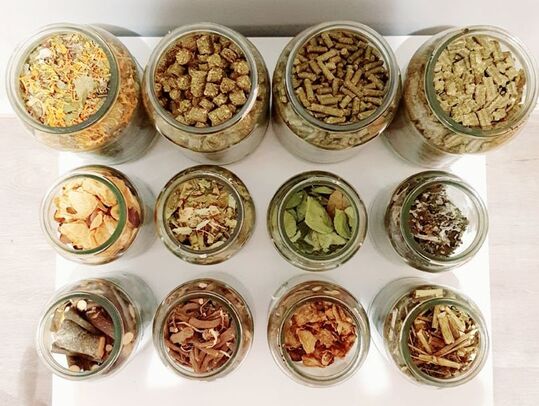Fibrevores
A rabbits diet is extremely important for their long term health. Rabbits are Fibrevores which means they should eat a diet high in fibre to keep their digestive system continually moving, purely vegetation (herbivores) and be grazing on hay or grass for a huge portion of time per day. 85-90% of a rabbit diet should be good quality feeding hays and grasses.
Rabbits are natural foragers and should be working and searching for their food. This keeps them more active and makes them work for their food a bit more. Feeding food in bowls only encourages laziness and resource guarding.
Rabbits are natural foragers and should be working and searching for their food. This keeps them more active and makes them work for their food a bit more. Feeding food in bowls only encourages laziness and resource guarding.
Ways to Feed
1. Scatter feeding by either throwing food into their enclosure, by creating a foraging box or ball pit and scatter the food inside.
2. Use a treat dispensing ball which they have to roll to get their pellets out. This encourages exercise and playing.
3. Hand feeding. This is particularly good for training and encouraging interaction and bonding with their care giver.
2. Use a treat dispensing ball which they have to roll to get their pellets out. This encourages exercise and playing.
3. Hand feeding. This is particularly good for training and encouraging interaction and bonding with their care giver.
Hays & Grasses
There are so many varieties of hay and you may be left wondering which is best? There are two types of hay: feeding hays and bedding hays. Bedding hay is brown/yellow, dusty and not very nutritious. The first thing you must consider is the nutritional values of the hays as rabbits need the most amount of fibre possible. Timothy hay has the highest fibre content so this is the hay which should be given as the bulk of their diet.
Things to look for in good hay is; thick, long strands, stalky and greenish/golden in colour (not brown). You can also get hays with added forage, flowers etc added and nice thick oat hay is also appreciated by buns. Once your buns are given good quality hay, you will have a very hard find getting them to eat anything else. They will also have excellent big golden poops which tells you that they are eating enough fibre! Learn more about hay here
Things to look for in good hay is; thick, long strands, stalky and greenish/golden in colour (not brown). You can also get hays with added forage, flowers etc added and nice thick oat hay is also appreciated by buns. Once your buns are given good quality hay, you will have a very hard find getting them to eat anything else. They will also have excellent big golden poops which tells you that they are eating enough fibre! Learn more about hay here
Treats
The best treats for rabbits are the ones as natural as possible. The best diet is one close to their wild ancestors. Dried and fresh foliage, herbs, branches, flowers etc is the best. Forget the "supermarket" veg! Veg is rich, high in sugar and is equivalent to giving your children lots of sweets. Instead, go out and pick them a few dandelions, rose petals and willow or apple branches. This will be delicious for them as well as good for their gut and teeth. Avoid colourful, shop bought treats and fruit. Home grow some herbs such as parsley, basil, coriander, mint and dill as a healthy, tasty alternative to veg.
Rabbits cannot digest seeds or corn and can be fatal for them so should NEVER be given. Other TOXIC foods include: Onions, Yoghurt Drops, Muesli, Avocado, Bread, Dairy.
Drinking
Only pure water should be given to rabbits with nothing added. They should have access 24/7 to fresh cool drinking water. The best water for rabbits is in fact rain water, as there is no calcium or chlorine added like tap water. Some rabbit care giver collect rain water in a water butt for their rabbits.
Bowls or water dispensers should always be used for water. If offering a bottle, bowls should also always be available. Studies show that rabbits drink far more from a bowl as this is more natural.
Bowls or water dispensers should always be used for water. If offering a bottle, bowls should also always be available. Studies show that rabbits drink far more from a bowl as this is more natural.
Nutrition
It is widely known and understood that rabbits diet should be made up of the main portion hays, “greens” next and then a small portion as pellets and a few treats. Just the same as humans have their food “pyramid” to a balanced diet, so do rabbits. Does that apply to every rabbit though? If we look at humans, our dietary requirements and nutritional needs vary depending on our age, gender, size and activity level. Shouldn’t that be the same for our rabbits?
Our current understanding of rabbit nutrition is based upon two types of rabbits – lab/meat rabbits and wild rabbits. Do either of these represent our typical domestic pet rabbit now? No, not at all! So what do we know about rabbit nutrition?
FACT: We know that rabbits are fibrevores which means their diet must be made up of predominantly fibre in order for their digestive system to work properly. Their guts work fast which means it must always be kept moving.
FACT: We know that in the wild, rabbits eat more grass than a sheep does. Which means grass must be pretty important, right?
FACT: We know that rabbits chew around 120 times per minute, so those mouths are always moving and those teeth always need to be chomping and grinding.
FACT: We know that lab and meat farmed rabbits are fed diets mainly of grains and carbohydrates for bulking them up which promotes obesity and dental disease.
FACT: We know that rabbits have been shown to be selective feeders and that pelleted feed is recommended over muesli type feeds due to their desire to choose unhealthy first over healthy.
So what about our domestic rabbits? Domestic rabbits still have the same basic dietary needs as the Wild European rabbit does which is a diet high in fibre. But what about all the other nutritional needs? Our pet rabbits are living older than they ever have, have varying health issues and varying breeds are different in their activity levels and “rabbity behaviours”. Surely this wide variety of types, ages and health needs of rabbits cannot all have the exact same nutritional needs?
Our current understanding of rabbit nutrition is based upon two types of rabbits – lab/meat rabbits and wild rabbits. Do either of these represent our typical domestic pet rabbit now? No, not at all! So what do we know about rabbit nutrition?
FACT: We know that rabbits are fibrevores which means their diet must be made up of predominantly fibre in order for their digestive system to work properly. Their guts work fast which means it must always be kept moving.
FACT: We know that in the wild, rabbits eat more grass than a sheep does. Which means grass must be pretty important, right?
FACT: We know that rabbits chew around 120 times per minute, so those mouths are always moving and those teeth always need to be chomping and grinding.
FACT: We know that lab and meat farmed rabbits are fed diets mainly of grains and carbohydrates for bulking them up which promotes obesity and dental disease.
FACT: We know that rabbits have been shown to be selective feeders and that pelleted feed is recommended over muesli type feeds due to their desire to choose unhealthy first over healthy.
So what about our domestic rabbits? Domestic rabbits still have the same basic dietary needs as the Wild European rabbit does which is a diet high in fibre. But what about all the other nutritional needs? Our pet rabbits are living older than they ever have, have varying health issues and varying breeds are different in their activity levels and “rabbity behaviours”. Surely this wide variety of types, ages and health needs of rabbits cannot all have the exact same nutritional needs?

